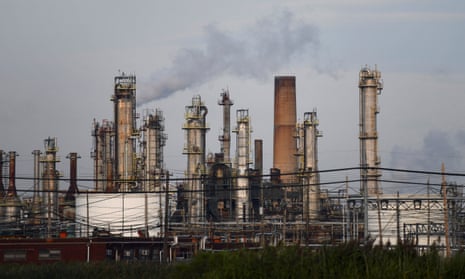People in the US are more sharply divided along political lines when it comes to science and environmental issues than in other parts of the world, new research shows.
Globally, people who see themselves on the left side of politics are more likely to be concerned about the environment than those who see themselves as being on the right or in the centre ground.
But in the US, that divide is much sharper, according to an international survey by the Pew Research Center. About four in 10 US citizens who are on the right politically would prioritise protecting the environment, even if it caused slower economic growth and some loss of jobs, compared with 87% of those on the left.
In Europe, Australia, Canada, Brazil and South Korea, the divide was much less marked. Of those on the right in the UK, 68% would prioritise the environment, similar to the numbers in Italy, Sweden, Poland, Spain and France. On the left in the UK, 84% would prioritise environmental protection, similar to the proportion in other European countries.
The polls, published on Tuesday, were undertaken earlier this year, before the coronavirus outbreak reached pandemic proportions.
Overall, there was still a clear majority who supported protecting the environment in the US, at nearly two-thirds (64%) of the population, with a similar number (63%) saying the government was doing too little to address the climate crisis. About half of respondents said climate change was a very serious problem, and that human activity contributed a great deal to climate change.
Only one in five people with right-wing political views said they had a lot of trust in scientists, compared with more than six in 10 people on the left, in the US.
The Pew results show that people in 20 nations around the world have a strong regard for scientists generally, with about eight in 10 globally saying government investment in scientific research was worthwhile.
Cary Funk, the director of science and society research at Pew, said: “These findings showcase the generally positive views that publics around the world hold for scientists and their work, as well as ideological fault lines in many places over how much to trust scientists.”
Although the questions were asked before the effects of coronavirus became apparent, they could indicate difficulties for governments in deploying vaccines.
Respondents were asked about the preventive health benefits of childhood vaccines, such as those for measles, mumps and rubella. In Sweden, a majority (84%) said the benefits were high, but only 49% said the same in Russia. In the US, one in 10 people said there were no preventive health benefits from such vaccines, and 37% said there was a high or medium risk of side-effects.
In the UK, about six in 10 people said they thought the country’s achievements in science were above average, or the best in the world. Nearly seven in 10 said the UK government was not taking enough action on the climate crisis.
